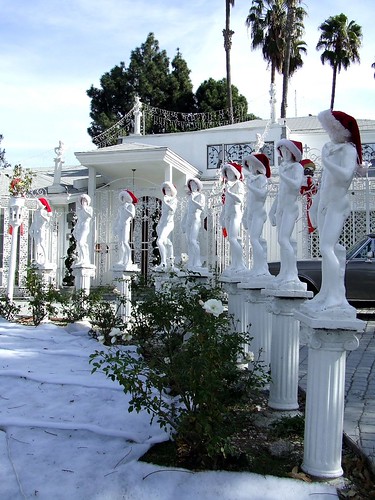 I don't really have a good photo that goes with the reading, so here's a Christmasy picture of the house with all the Davids in front of it in my neighborhood.
I don't really have a good photo that goes with the reading, so here's a Christmasy picture of the house with all the Davids in front of it in my neighborhood. I remember reading someone who used this quote from Renata Adler: "Sanity is the most profound moral option of our time." Then I read the actual Renata Adler novel ("Speedboat," maybe) and didn't like it. But I still like the quote, and these difficult times bring it home: it's easy to think of sanity as our default condition, but I doubt that it is, you have to choose it. It's a lot easier, really, to let yourself get carried away -- all you have to do is just sit there.
The above thought is brought to mind by today's essay by Sainte-Beuve, a name which is fun to say in a phony French accent. It's titled "What Is A Classic?" and the translation, sadly, is not supple:
It is true that in writing of such subjects, always slightly abstract and moral, it is advisable to speak of them in a season of quiet, to make sure of our own attention and of that of others, to seize one of those moments of calm moderation and leisure seldom granted our amiable France...I suspect that this is what my writing sounds like. Maybe (a little like that character in Moliere) I have been writing translationese all along.
Sainte-Beuve's answer to the question doesn't occur till halfway in. I would have totally abandoned the piece by then if I hadn't had to read it. But I liked it:
A true classic, as I should like to hear it defined, is an author who has enriched the human mind, increased its treasure, and caused it to advance a step; who has discovered some moral and not equivocal truth, or revealed some eternal passion in that heart where all seemed known and discovered; who has expressed his thought, observation, or invention, in no matter what form, only provided it be broad and great, refined and sensible, sane and beautiful in itself; who has spoken to all in his own peculiar style, a style which is found to be also that of the whole world, a style new without neologism, new and old, easily contemporary with all time.Some of this is tautological -- a classic is something that's great! -- and some of this is in response to the idea that a classic must be very old, but the part that stands out to me is "refined and sensible, sane and beautiful." These are old-timey adjectives, pre-modern adjectives -- I wouldn't limit a classic to only those that have these qualities, but the classics I love, by and large, do. (Sainte-Beuve's great example, in fact, is Moliere; but he also loves Shakespeare who, in my opinion, is not refined. Refinement actually seems more appropriate to the French than to us Anglos -- it's why we needed to import the word "finesse".)
Another thing I came to like in this essay is that Saint-Beuve is looking to cast his net widely. To be sure, he wants to make distinctions, like a good French critic should, but I got the sense he'd rather include than exclude:
Meanwhile there is no question of sacrificing or depreciating anything. I believe the temple of taste is to be rebuilt; but its reconstruction is merely a matter of enlargement, so that it may become the home of all noble human beings, of all who have permanently increased the sum of the mind’s delights and possessions.Exactly so. The feeling I enjoy here is that even us no-talents ought to share in the progress of the human project. Even in satire, I prefer art that's for something, not against something -- especially in satire, because how can you eviscerate someone for falling short of something if you yourself don't know what the "something" is that they're falling short of?
Anyway. The essay ends with a little fantasy of all his favorite writers sporting themselves around what appears to be a first-class retirement home, and which we can skip, but the last lines are a description of why one loves the classics, and it's a little sentimental, perfect for the holidays:
...of some one of those excellent and antique minds shall we request an interview at every moment; of some one of them shall we ask a friendship which never deceives, which could not fail us; to some one of them shall we appeal for that sensation of serenity and amenity (we have often need of it) which reconciles us with mankind and with ourselves.
Photo by flickr user solyanka used with a Creative Commons license.
2 comments:
I love the quotes you chose. To me, they seem to explain "classic" simply and yet completely. I also think you chose the perfect picture to illustrate the antithesis of refined and sensible, sane and beautiful.
I know this holiday will be bittersweet, but I wish you serenity and amiability.
. . . here's a Christmasy picture of the house with all the Davids in front of it in my neighborhood.
Oh my dear god.
!!!
Post a Comment